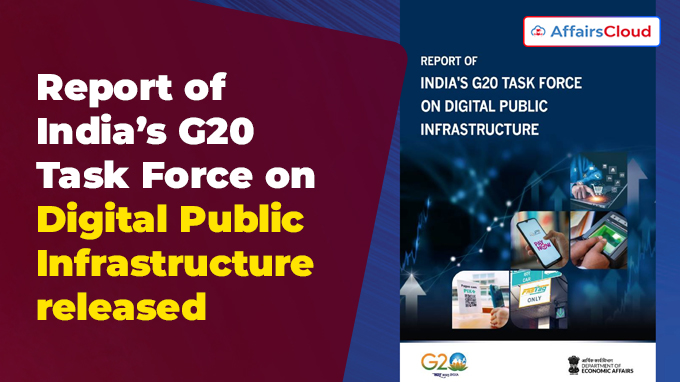
The final “Report of India’s G20 Task Force on Digital Public Infrastructure” was released in New Delhi, New Delhi. The report aims to strengthen the foundations of the Digital Public Infrastructure (DPI) worldwide.
- This Report was prepared by “India’s Group of Twenty (G20) Task Force on DPI for Economic Transformation, Financial Inclusion and Development.”
The report sets a strategic direction for the DPI, aiming to accelerate economic progress and improve transparency, and public services globally, especially in the Global South.
What is DPI?
i.DPI is an infrastructure-based approach that uses technology to create foundational structures for societal development through an ecosystem.
ii.The ecosystem which comprises technology, markets, and governance, is designed to serve societal goals and public interests.
About the Report:
The Report encompasses 3 essential parts that collectively resolve the approach for global DPI advancement and adoption.
Part 1: The DPI Approach:
i.The report introduces the DPI Approach as a transformative paradigm.
ii.It addresses global challenges with innovative technological solutions.
Part 2: The Global Movement of DPI:
i.The Report explores India’s role in advancing DPI during its G20 Presidency in 2023.
ii.It highlights efforts through various working groups, including the Global Partnership for Financial Inclusion (GPFI) and the Digital Economy Working Group (DEWG) of Sherpa Track.
Part 3: The Way Forward for Global Advancement of DPI:
This part of the Report presents a forward-looking perspective, outlining a strategic blueprint for elevating DPI across various sectors, and on a global scale through a range of its policy recommendations.
Key Insights:
i.The Report emphasises the need for global standards and multinational collaboration to foster the DPI ecosystem.
ii.It underscores the importance of national digital infrastructure for economic progress.
iii.It will play a key role in defining the future course of the DPI approach and actions for global implementation.
Task Force and Leadership:
i.‘India’s G20 Task Force on DPI for Economic Transformation, Financial Inclusion and Development’ was established in January 2023 to oversee and facilitate India’s G20 Presidency agenda and priorities on DPI and Financial Inclusion.
ii.It focuses on enhancing productivity through digital technology and DPI across sectors, supporting the government’s digital economy policies and regulations.
- The Task Force’s work led to the acceptance of the DPI definition and framework during India’s G20 Presidency.
iii.The Task Force was led by Amitabh Kant, G20 Sherpa of India, and Nandan Nilekani, Co-founder and Chairman of Infosys Limited and the Founding Chairman of the Unique Identification Authority of India (UIDAI) (Aadhaar).
Key Points:
i.The DPI enabled significant economic and social benefits, including the widespread use of the Unified Payments Interface (UPI) and Aadhaar.
- The UPI accounts for nearly 46% of digital transactions globally.
ii.Aadhaar covers about 1.3 billion Indians, facilitating 10 million electronic Know Your Customer (eKYC) verifications daily.
iii.UPI enables 13 billion transactions monthly, serving 350 million individuals and 50 million merchants.
iv.The DPI-enabled direct transfers have saved the Indian government USD 41 billion across central schemes.
Recent related News:
On April 25-26, 2024, the 1st United Nations (UN) Conference on “Citizen Stack: Digital Public Infrastructure, Transformative Technology for Citizens” was held in New York, the United States of America (USA) under India’s leadership to harness the technology to propel Sustainable Development Goal (SDG) and foster inclusivity. The Conference introduced India’s Digital Public Infrastructure (DPI) framework as a global standard.




